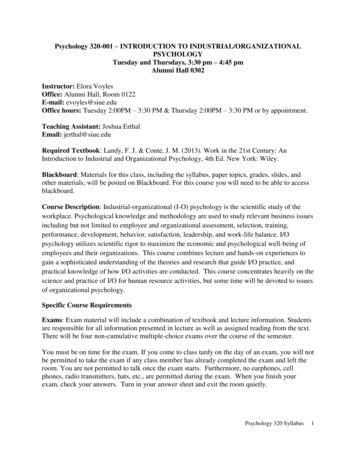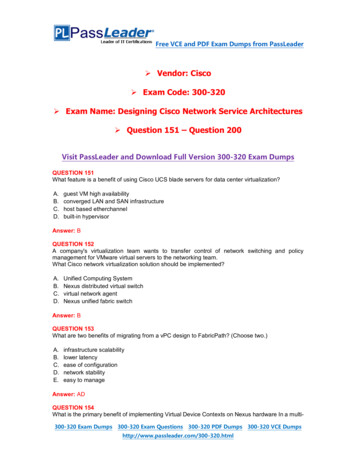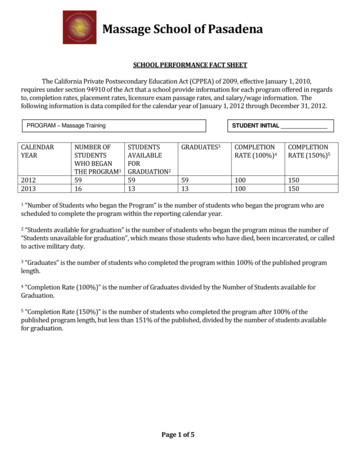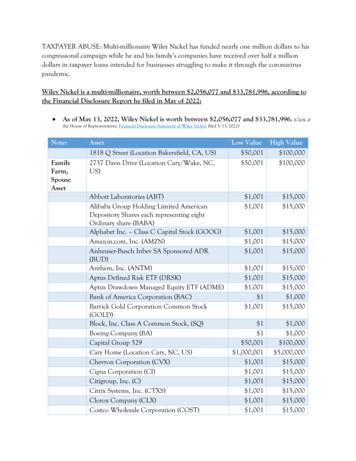
Transcription
Psychology 320-001 – INTRODUCTION TO INDUSTRIAL/ORGANIZATIONALPSYCHOLOGYTuesday and Thursdays, 3:30 pm – 4:45 pmAlumni Hall 0302Instructor: Elora VoylesOffice: Alumni Hall, Room 0122E-mail: evoyles@siue.eduOffice hours: Tuesday 2:00PM – 3:30 PM & Thursday 2:00PM – 3:30 PM or by appointment.Teaching Assistant: Joshua ErthalEmail: jerthal@siue.eduRequired Textbook: Landy, F. J. & Conte, J. M. (2013). Work in the 21st Century: AnIntroduction to Industrial and Organizational Psychology, 4th Ed. New York: Wiley.Blackboard: Materials for this class, including the syllabus, paper topics, grades, slides, andother materials, will be posted on Blackboard. For this course you will need to be able to accessblackboard.Course Description: Industrial-organizational (I-O) psychology is the scientific study of theworkplace. Psychological knowledge and methodology are used to study relevant business issuesincluding but not limited to employee and organizational assessment, selection, training,performance, development, behavior, satisfaction, leadership, and work-life balance. I/Opsychology utilizes scientific rigor to maximize the economic and psychological well-being ofemployees and their organizations. This course combines lecture and hands-on experiences togain a sophisticated understanding of the theories and research that guide I/O practice, andpractical knowledge of how I/O activities are conducted. This course concentrates heavily on thescience and practice of I/O for human resource activities, but some time will be devoted to issuesof organizational psychology.Specific Course RequirementsExams: Exam material will include a combination of textbook and lecture information. Studentsare responsible for all information presented in lecture as well as assigned reading from the text.There will be four non-cumulative multiple-choice exams over the course of the semester.You must be on time for the exam. If you come to class tardy on the day of an exam, you will notbe permitted to take the exam if any class member has already completed the exam and left theroom. You are not permitted to talk once the exam starts. Furthermore, no earphones, cellphones, radio transmitters, hats, etc., are permitted during the exam. When you finish yourexam, check your answers. Turn in your answer sheet and exit the room quietly.Psychology 320 Syllabus1
Exam Make-Up Policy: You can make up missed exams during the last week of classes duringthe university-assigned final exam period. The assigned final exam period will be the only timeavailable when exams are made up. If you miss the make-up exam no further opportunity to takethe exam will be provided. Make-ups for more than two missed exams will not be accepted.Projects:There will be a total of 2 projects. One project will involve conducting job analysis and it will beworth 25 points total.The remaining project includes 4 parts (each worth 25 points) which are all connected to allowstudents an opportunity to gain "hands-on" experience with I/O methods and procedures.Projects must be conducted and turned in individually. Project assignments will be assignedthroughout the semester (and posted on Black Board), but generally the project will focus on thelecture/text topics covered during the time frame of the project. The second project has foursections due throughout the semester, (each worth 25 points) for a total of 100 points. Projectsections are due on the date specified in the schedule below, unless otherwise announced.Note: Mandatory requirements for projects. Each of the following points must be adhered to inorder for projects to be graded. Failure to follow these guidelines will result in a grade of 0.Attendance: Regular class attendance is expected in this course. Students are responsible formeeting the course requirements on assigned dates as outlined in the course syllabus. You areresponsible for all material discussed in class whether you attend or not; you are also responsiblefor material covered in assigned readings. As an incentive, there will be six in-class exercisesthat can only be completed during class attendance.Due Dates: Assignments are due on the date and time posted on the course calendar orBlackboard. Late assignments will have grades deducted 20% of possible points for each day it islate.Cell phone policy: Cell phones and other devices will sometimes be used as devices foranswering questions in class. Please limit the use of phones for non-class related activities.Grade Calculation: The final letter grade for each student will be determined by the followingcriteria:Exams (4 Exams 60 points each)Project 1 (50 points)Project 2 (4 parts with 25 points ea)In-Class (4 activities 2.5 points ea)TOTAL 240 points50 Points100 Points10 Points400 PointsPsychology 320 Syllabus2
Criteria for letter grades:360 - 400 total points320 - 359 total points280 - 319 total points240 - 279 total pointsLess than 239 points ABCDFPetitions in Writing Only: Sometimes, discrepancies arise between a student's and aninstructor's perceptions regarding grades. You are always welcome to discuss your grades withthe instructor during office hours. However, if you want me to consider changing your grade,then you must turn in a petition in writing within one week of receiving your grade on the examor assignment. You must outline specifically why and how your work warrants more credit.Submitting written petitions does not guarantee point adjustments.Please note: There is no curve for this course, and there will be no rounding of points. You arestarting this course with 0 points and you will have to earn every point to get up to an “A” (orwhatever your goal is). If you find yourself falling behind or getting confused, it is yourresponsibility to get help immediately. If you wait until the end of the course to get help, it isgenerally too late to bring your grade up. Furthermore, absolutely all make-up work for thiscourse must be turned in no later than the beginning of the Final Exam. Students will not be ableto turn in any assignment for course credit after the Final Exam has been given in class.Course Schedule*: I/O Psychology Fall 2019DateTue., Aug. 20Thu., Aug. 22Tue., Aug. 27Thu., Aug. 29Tue., Sep. 3Thu., Sep. 5Tue., Sep. 10Thu., Sep. 12Tue., Sep. 17TopicAssignments DueReading AssignmentCourse IntroductionHistory of I/O PsychologyChapter 1History and Research MethodsChapter 2Research MethodsChapter 2Job AnalysisChapter 3Job Analysis – In Class ActivityChapter 3Exam 1 (Chapters 1, 2, 3)Exam 1Performance AppraisalJob AnalysisProject DuePerformance Appraisal- In ClassActivityChapter 4Chapter 4Psychology 320 Syllabus3
Thu., Sep. 19Tue., Sep. 24Thu., Sep. 26Tue., Oct. 1Thu., Oct. 3Tue., Oct. 8Thu., Oct. 10Tue., Oct. 15Thu., Oct. 17Tue., Oct. 22Thu., Oct. 24Tue., Oct. 29Thu., Oct. 31Tue., Nov. 5Thu., Nov. 7Tue., Nov. 12Thu., Nov. 14Thu., Nov. 21Tue., Nov. 26Thu., Nov. 28Tue., Dec. 3Thu., Dec. 5PredictorsChapter 5PredictorsChapter 5Selection and Personnel LawChapter 6Selection and Personnel LawChapter 6Exam 2 (Chapters 4, 5, 6)Exam 2Personnel TrainingPersonnel TrainingChapter 7Project Part 1DueChapter 7Work MotivationChapter 8Work MotivationChapter 8Job AttitudesChapter 9Job Attitudes – In ClassActivityChapter 9Exam 3 (Chapters 7, 8, 9)Exam 3Work Groups and TeamsWork Groups and TeamsChapter 13Project Part 2DueChapter 13LeadershipChapter 12LeadershipChapter 12Stress- In Class ActivityChapter 10No Class - Work on Project 3No Class- ProjectPart 3 DueNo ingThanksgivingThanksgivingStressExam 4 (Chapters 13, 12, 10)Chapter 10Exam 4. ProjectPart 4 DuePsychology 320 Syllabus4
The Psychology Department’s Policy on Plagiarism: Plagiarism includes presenting someoneelse’s words without quotation marks (even if you cite the source), presenting someone else’sideas without citing that source, or presenting one’s own previous work as though it were new.When paraphrasing from another source or your own work, at the very least, the student shouldchange the wording, sentence syntax, and order of ideas presented in the paper. Additionally,you should not submit a paper, or parts of a paper, written to fulfill the requirements of one classfor the requirements in another class without prior approval of the current instructor andappropriate citation. Ideally, the student will integrate ideas from multiple sources whileproviding critical commentary on the topic in a way that clearly identifies whether words andideas are those of the student or are from another source. Plagiarism is one type of academicmisconduct described in SIUE's Student Academic Code(http://www.siue.edu/policies/3c2.shtml). University policy states that “Normally a student whoplagiarizes shall receive a grade of F in the course in which the act occurs. The offense shall alsobe reported to the Provost.” (http://www.siue.edu/policies/1i6.shtml). The University policydiscusses additional academic sanctions including suspension and expulsion from the University.To insure that you understand how to avoid plagiarism, we encourage you to review theinformation on plagiarism provided on the Department of Psychology web giarism.shtml.Accommodations for Students with Disabilities: Students needing accommodations because ofmedical diagnosis or major life impairment will need to register with Accessible CampusCommunity & Equitable Student Support (ACCESS) and complete an intake process beforeaccommodations will be given. Students who believe they have a diagnosis but do not havedocumentation should contact ACCESS for assistance and/or appropriate referral. The ACCESSoffice is located in the Student Success Center, Room 1270. You can also reach the office by email at myaccess@siue.edu or by calling 618.650.3726. For more information on policies,procedures, or necessary forms, please visit the ACCESS website at www.siue.edu/access.Policy on Children in ClassI never want a student to have to choose between their education and caring for their child;therefore, I have the following policy regarding children in the classroom:All exclusively breastfeeding babies are welcome in class as often as is necessary to support thebreastfeeding relationship. For older children and babies, I understand that minor illnesses andunforeseen disruptions in childcare often put parents in the position of having to choose betweenmissing class to stay home with a child and leaving him or her with someone you or the childdoes not feel comfortable with. While this is not meant to be a long-term childcare solution,occasionally bringing a child to class in order to cover gaps in care is perfectly acceptable. I askthat all students work with me to create a welcoming environment that is respectful of all formsof diversity, including diversity in parenting status.Psychology 320 Syllabus5
The Psychology Department’s Policy on Incomplete Grades: It is the student's responsibilityto officially withdraw from a course by the dates set by the University if the student is notintending to complete the course. Students who do not withdraw and have not completed thecourse will receive an F. Only under special circumstances a faculty member may agree to give astudent an Incomplete (INC) grade in order to allow the student to complete the remaining workfor the course no later than the end of the following semester. An INC is never automatic butmust be approved by the professor. If a professor agrees to give a student an INC grade, theprofessor and the student will fill out a form (Memorandum of Incomplete Grade) indicating whyan INC is being given. One copy of the completed form will be given to the student, one copywill be given to the professor, and the Department of Psychology secretary will keep one copy. Ifthe work is not completed by the time specified on the Memorandum of Incomplete Grade form,the grade will be changed from INC to F.SIUE Statement on Diversity: All societies and peoples have contributed to the rich mix ofcontemporary humanity. In order to achieve domestic and international peace, social justice, andthe development of full human potential, we must build on this diversity. SIUE nurtures an open,harmonious, and hospitable climate that facilitates learning and work. Each member of theUniversity is responsible for contributing to such a campus environment.SIUE Nondiscrimination Policy: Southern Illinois University Edwardsville (SIUE) is a publiccomprehensive University committed to creating and maintaining a diverse community in whichstudents, faculty, and staff can learn and work together in an environment free of discriminationand free from any form of illegal harassment. Such actions violate the dignity of the individualand the integrity of the University as an institution of learning. SIUE prohibits discriminationagainst employees, applicants for employment and students on the basis of age, color, disability,marital status, national origin, race, religion, sex, sexual orientation, or veteran’s status.Discrimination in any form will not be tolerated; management and supervisory personnel, at alllevels, are responsible for taking reasonable and necessary action to prevent discrimination.Psychology 320 Syllabus6
Psychology 320 Syllabus 1 Psychology 320-001 - INTRODUCTION TO INDUSTRIAL/ORGANIZATIONAL PSYCHOLOGY Tuesday and Thursdays, 3:30 pm - 4:45 pm Alumni Hall 0302 Instructor: Elora Voyles Office: Alumni Hall, Room 0122 E-mail: evoyles@siue.edu Office hours: Tuesday 2:00PM - 3:30 PM & Thursday 2:00PM - 3:30 PM or by appointment. Teaching Assistant: Joshua Erthal










